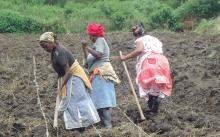Land Library
Welcome to the Land Portal Library. Explore our vast collection of open-access resources (over 74,000) including reports, journal articles, research papers, peer-reviewed publications, legal documents, videos and much more.
/ library resources
Showing items 1 through 9 of 10.In Mozambique, changes in land access and use are shaping new landscapes, often at the expense of the poor.
Land registration and titling in Africa has been seen as a means of legal empowerment of the poor that can protect smallholders’ and pastoralists’ rights of access to land and other landbased resources.
Access to land is key to achieving food security, poverty alleviation, social equity and environmental protection. A brief insight in land governance-related principles and policies of the German development assistance.
The preservation, development and sustainable use of agricultural land are of vital importance to ensure longterm food security in South Africa.
The Committee received a presentation of the evaluation report on the implementation of the Comprehensive Rural Development Programme (CRDP) by the Department of Perfomance, Monitoring and Evaluation (DPME).
Increasing prices for agricultural commodities offer a historic opportunity to intensify production systems for small-scale farmers in many developing countries.
Not only has soil degradation in Niger been halted thanks to an integrated approach combining water harvesting technologies, the application of organic residues and planting of fruit trees and vegetables.
The livelihoods of many rural dwellers are dependent on having secure and equitable access to land. Tenure security is also a prerequisite for sustainable land management. The massive interest of commercial investors has increased the pressure on land globally.
Market liberalisation in the 1980/90s brought about fundamental changes to marketing structures in Africa, creating new opportunities but also, often, making it more difficult for smallholders to access markets.






